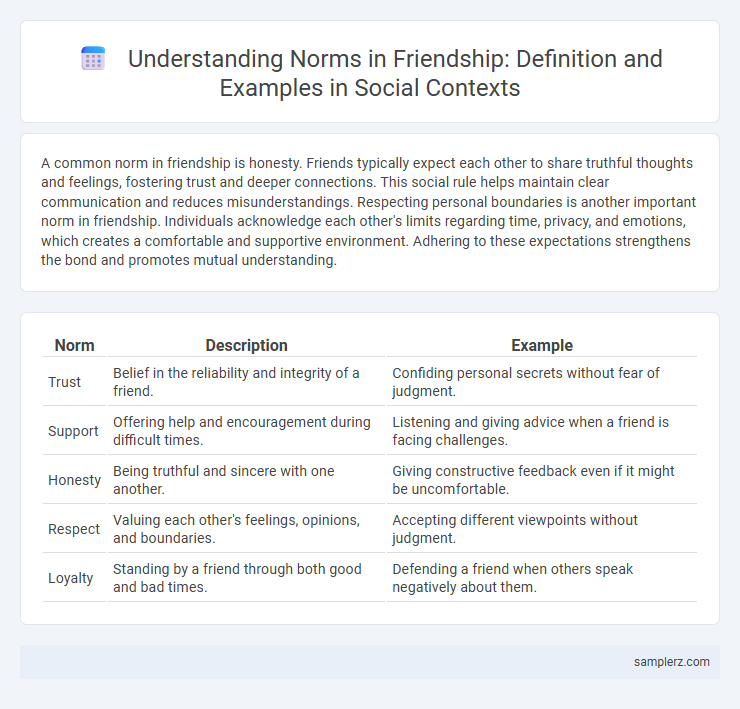A common norm in friendship is honesty. Friends typically expect each other to share truthful thoughts and feelings, fostering trust and deeper connections. This social rule helps maintain clear communication and reduces misunderstandings. Respecting personal boundaries is another important norm in friendship. Individuals acknowledge each other's limits regarding time, privacy, and emotions, which creates a comfortable and supportive environment. Adhering to these expectations strengthens the bond and promotes mutual understanding.
Table of Comparison
| Norm | Description | Example |
|---|---|---|
| Trust | Belief in the reliability and integrity of a friend. | Confiding personal secrets without fear of judgment. |
| Support | Offering help and encouragement during difficult times. | Listening and giving advice when a friend is facing challenges. |
| Honesty | Being truthful and sincere with one another. | Giving constructive feedback even if it might be uncomfortable. |
| Respect | Valuing each other's feelings, opinions, and boundaries. | Accepting different viewpoints without judgment. |
| Loyalty | Standing by a friend through both good and bad times. | Defending a friend when others speak negatively about them. |
Defining Social Norms in Friendships
Social norms in friendships typically include expectations such as mutual respect, trust, and reciprocity. For example, sharing personal information while maintaining confidentiality reflects a core norm of trustworthiness. These unwritten rules help regulate behavior, ensuring supportive and balanced relationships among friends.
Respecting Personal Boundaries Among Friends
Respecting personal boundaries among friends is essential for maintaining trust and mutual understanding. This norm includes recognizing each other's need for privacy, avoiding intrusive questions, and honoring decisions about personal space or time. Upholding these boundaries strengthens emotional safety and promotes healthier, more supportive friendships.
Communication Etiquette Between Friends
Effective communication etiquette between friends includes active listening, maintaining confidentiality, and respecting personal boundaries during conversations. Friends avoid interrupting each other, use polite language, and provide constructive feedback to support mutual understanding. Regularly checking in and expressing appreciation helps strengthen trust and emotional connection within the friendship.
Honesty and Transparency in Friendship
Honesty and transparency in friendship establish trust and deepen emotional connections between individuals. Friends who openly share their thoughts and feelings foster a supportive environment that encourages mutual understanding and respect. This norm prevents misunderstandings and strengthens the bond, ensuring long-lasting and meaningful relationships.
Reciprocity and Mutual Support as Friendship Norms
Reciprocity and mutual support form fundamental norms in friendship, ensuring that both parties consistently give and receive emotional, practical, or social assistance. This dynamic balance fosters trust and strengthens relational bonds, as friends expect equitable exchanges of kindness and support over time. Research in social psychology highlights that friendships characterized by high reciprocity and mutual support tend to display increased satisfaction and durability.
Loyalty and Trustworthiness in Social Circles
Loyalty in social circles is exemplified by consistently supporting friends during challenges, reflecting a deep commitment to their well-being. Trustworthiness is demonstrated through honest communication and respecting confidences, which solidifies the foundation of genuine friendships. These norms ensure resilience and mutual respect within social bonds.
Conflict Resolution Norms in Friendships
Conflict resolution norms in friendships often include open communication, active listening, and mutual respect to address disagreements constructively. Friends typically agree to avoid blame and instead focus on understanding each other's perspectives to maintain trust and emotional support. These norms help prevent misunderstandings and promote long-term relationship stability.
Celebrating Milestones and Achievements Together
Friends often recognize and celebrate significant milestones such as birthdays, graduations, and promotions, reinforcing their bond and mutual support. These shared celebrations create lasting memories and affirm the importance of each person's achievements within the friendship circle. Acts like organizing parties or giving thoughtful gifts exemplify the norm of honoring each other's successes collectively.
Giving Space and Maintaining Independence
Respecting personal boundaries and allowing friends time alone fosters trust and strengthens relationships. Encouraging individual interests and supporting personal growth ensures friendships remain balanced and healthy. This norm promotes emotional well-being by valuing both connection and autonomy.
Inclusivity and Avoiding Peer Pressure Among Friends
A core norm in friendship is fostering inclusivity by actively welcoming diverse perspectives and backgrounds, which strengthens trust and mutual respect. Friends who prioritize inclusivity create safe spaces where everyone feels valued and accepted, preventing exclusion or bias within the group. Upholding the norm of avoiding peer pressure ensures that individuals make authentic choices without feeling coerced, promoting genuine support and emotional well-being.

example of norm in friendship Infographic
 samplerz.com
samplerz.com